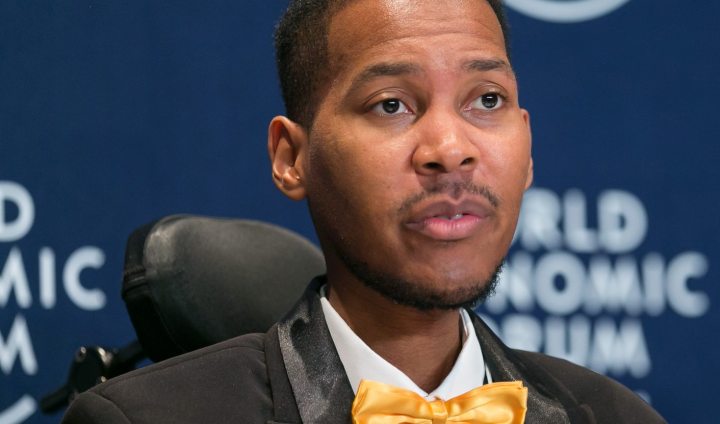Maverick Life
Op-Ed: Love letter to myself

Schools rejected you time and time again. It was said that you would never ever cut it in the formal education system. But you persisted, and in the process broke down barriers. By EDWARD NDOPU.
Isn’t it incredible? You have outlived yourself. Twenty years ago medical experts told your mother that due to spinal muscular atrophy you would not live past your fifth birthday. And yet, here you are. You have just celebrated your 25th birthday and your 20th “I–sidestepped–death–and–survived–my–prognosis” anniversary.
No one, let alone the doctors who diagnosed you all those years ago, could have imagined that you would one day become the young man you are today. Even your mother, who has always been and will always be your biggest fan, marvels in sheer amazement whenever she looks into your eyes. She’s both proud and stunned beyond belief. You, yourself, are proud of and stunned by the young man you have become. But with that comes guilt, frustration and anxiety.
You feel guilty because you have left folks behind. You have left millions of disabled twentysomethings, scattered throughout the global south, behind. In some ways they are like you. Young. Black. Profoundly disabled. But in many ways they are not like you. You live a life they can barely imagine. Unlike you, they are locked up in the backrooms of grim nursing homes, made to disappear from public view, and are neglected and ill-treated by society and the state. You, on the other hand, have outstripped virtually every policy out there that seeks to level the playing field for people with disabilities. To this day, you are not sure how that happened because you came from a single-parent home in which your fearless mother, recovering from years of abuse at the hands of your often absent father, and struggled to make ends meet for most of your life.
Schools rejected you time and time again. It was said that you would never ever cut it in the formal education system. You persisted and in the process broke down barriers. You attained a fantastic education in South Africa, and eventually went on to carry out your undergraduate studies in Canada, graduating summa cum laude.
But despite now working for an organisation that makes a real difference, you still find yourself immersed in a world where you are almost always the only visibly disabled person in the room. It is a lonely experience. You frequent art museums and cocktail lounges and public lectures and nightclubs. Shopkeepers, bouncers, curators and friends of friends are lost for words whenever you show up and actually exist in an urban context. In their minds, black disabled twentysomethings only exist, if at all, in the context of deprivation and destitution. To some extent, they are right. You were never supposed to exist, let alone move through the world as you do now – visibly and bravely.
You feel frustrated because despite all the ways you continue to “successfully circumnavigate the pitfalls associated with disabled life” you still experience deeply entrenched inequality and, as a result, often feel depressed and misunderstood.
You have access to a range of technologies that help to improve the quality of your life. Voice recognition software. Your smart phone. Unlike most black and brown disabled twentysomethings across the global south, you are pretty much still able to get around. Your silver, jet-black motorized wheelchair. You live, work and hang out in spaces where you are likely to find elevators and wheelchair accessible washrooms.
Yet, you feel excluded. You feel like “checking out” most of the time. The global benchmark for access remains far too low and it simply breaks your heart. Despite your access to elevators and wheelchair accessible washrooms you do not quite have access to the things non-disabled adults take for granted. You don’t quite have access to intimacy, free-spiritedness and self-care on your own terms. It is almost as if there’s a cap placed upon your access. Everything in your life feels bureaucratic. Overly mediated. Your life has been boiled down to logistics. You struggle to draw a distinction between accessibility and instrumentality. For you they feel one and the same.
You do not want access for access sake. You want access beyond the instrumental logic of accessibility-speak. You want to play in the rain when you feel like it. You want to be perched on top of an elephant’s back in Bali. You want to find yourself on a beach in Barbados, making out in the moonlight. You want to unclench your muscles and just take a moment to catch your breath. You want to let go of all the anxiety associated with pretending to be functionally disabled in order to survive in an anti-disability world. You want to show up…fully, unapologetically yourself.
Don’t let the guilt, frustration and anxiety eat you up. Your very existence is a form of resistance. You are breaking barriers, unlocking doors, opening up opportunities, and making space without even realizing it. Your life and what it could mean for the lives of disabled twentysomethings everywhere means so much more than instrumentality disguised as accessibility.
Happy UN International Day for Persons with Disabilities, The brilliant, beautiful, magical young man looking back at you in the mirror. DM
Edward Ndopu, is head of Amnesty International’s youth engagement work for Africa. This is written in his personal capacity.
Photo: Edward Ndopu, Regional Activism and Youth Coordinator (Africa), Amnesty International, South Africa at the World Economic Forum on Africa 2015 in Cape Town. Copyright by World Economic Forum / Benedikt von Loebell


















 Become an Insider
Become an Insider